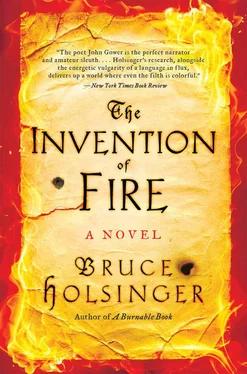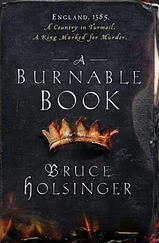Bruce Holsinger - The Invention of Fire
Здесь есть возможность читать онлайн «Bruce Holsinger - The Invention of Fire» — ознакомительный отрывок электронной книги совершенно бесплатно, а после прочтения отрывка купить полную версию. В некоторых случаях можно слушать аудио, скачать через торрент в формате fb2 и присутствует краткое содержание. Год выпуска: 2015, Издательство: HarperCollins, Жанр: Исторический детектив, на английском языке. Описание произведения, (предисловие) а так же отзывы посетителей доступны на портале библиотеки ЛибКат.
- Название:The Invention of Fire
- Автор:
- Издательство:HarperCollins
- Жанр:
- Год:2015
- ISBN:нет данных
- Рейтинг книги:3 / 5. Голосов: 1
-
Избранное:Добавить в избранное
- Отзывы:
-
Ваша оценка:
- 60
- 1
- 2
- 3
- 4
- 5
The Invention of Fire: краткое содержание, описание и аннотация
Предлагаем к чтению аннотацию, описание, краткое содержание или предисловие (зависит от того, что написал сам автор книги «The Invention of Fire»). Если вы не нашли необходимую информацию о книге — напишите в комментариях, мы постараемся отыскать её.
The Invention of Fire — читать онлайн ознакомительный отрывок
Ниже представлен текст книги, разбитый по страницам. Система сохранения места последней прочитанной страницы, позволяет с удобством читать онлайн бесплатно книгу «The Invention of Fire», без необходимости каждый раз заново искать на чём Вы остановились. Поставьте закладку, и сможете в любой момент перейти на страницу, на которой закончили чтение.
Интервал:
Закладка:
“How can you be so sure, given how the mayor has been acting since the killings?”
His swaying head jellied his cheeks as he walked. “I’ve told you all I know.”
I observed him from the side. “You are hiding something from me, Rysyng. What is it?”
His chin tilted up.
“Very well,” I said, stopping in the street once more. “I will visit the bishop tomorrow. I trust you’ll hear from him shortly thereafter.”
Rysyng stomped a shoe and wheeled on me. He puffed his reddened cheeks, then blew out a long, wheezing breath. “There was a piece of evidence,” he said. “Something found with the bodies. Brembre had it taken from the scene and ordered destroyed before the coroner’s arrival.”
Strode had hinted at this, though he had known none of the details. The coroner would have examined the bodies shortly after their recovery from the Walbrook, while Strode hadn’t been pulled in until the day after the inquest.
“What was it?”
“Strips of a livery banner, used to bind several of the victims’ hands.”
“The mayor ordered them removed?”
“And burned, or so I understand. All prior to the inquest, which was a cursory affair in any case.”
Nothing unusual there. The office of the king’s coroner lived on bribes, and if Brembre had wanted a cursory inquest he could have purchased one readily. “Could the heraldry on the banner be discerned?” I asked.
He hesitated. “Yes. Early that first morning, when the bodies were spread together on the ground, one of the sheriffs removed the silk strips from ten pairs of wrists. He laid them out together, and there it was.”
“Describe it.”
He made a decision, then, “Twin swans gorged, their necks entwined,” he said while closing his eyes. We both knew what this meant. The entwined swans distinguished the favored livery of Thomas of Woodstock, Duke of Gloucester, uncle of the king and leader of the appellant faction of lords opposing Richard. The man Michael de la Pole had invoked with such hatred at Westminster a few days before. The lord in whose household William Snell had labored before his appointment as king’s armorer-at the duke’s request. In that moment I felt something wobble on an unseen axis, as this inquiry into a London crime took on new weight and width, stretching itself beyond the city walls, reaching into the uppermost ranks of the realm.
“What can it mean?” I wondered aloud.
“Who can say?” Rysyng replied. Too lightly, I thought. “The duke, leaving his mark in the privy?”
Or an enemy, leaving the magnate’s livery on the victims. I wondered why the mayor would destroy such a telling piece of evidence, and what else Rysyng knew. Gloucester was Brembre’s sworn enemy. Anything damning of the duke should have been a treasure in his eyes. Yet something or someone, perhaps Gloucester himself, had got to the mayor following the recovery of the corpses.
We had made our way back to the priory’s almonry. Rysyng appeared eager to return within. I looked at him closely. “Why would Brembre do such a thing, Reverend Father? What kept him from publishing the duke’s banner far and wide, and thus casting his enemy in a foul light?”
“Perhaps he is being discouraged from pursuing an inquiry against Gloucester,” he said hintingly.
“By whom?”
An arch smirk. “You are not England’s sole trader in damning secrets, Gower, much as you like to imagine yourself so.”
“Only the most skillful,” I said wryly. “Now tell me.”
His face assumed a distant sadness. It lasted only a moment, then he said, “I must be free and clear of this matter, Gower. No more threats and extortions, do you understand?”
Not the murderous Walbrook affair, I realized, but his own, more delicate transgression.
“Tell me what you know, Reverend Father, and the history of your calamities shall be scraped from the tablet of my memory,” I said. “You have my sworn word.”
Though he had no reason to trust me the prior looked relieved. With relief came words. “I’ve heard only rumors, though believable ones. Several months ago the mayor’s name came up during a proceeding at the Guildhall. A routine interrogation by the sheriffs. The mayor himself was out of town.”
“Whom were the sheriffs questioning?”
“I wasn’t informed, though I’m told the subject was an embarrassing one for Brembre-quite dangerous as well. When Brembre returned to London he heard whispers of the interrogation and went into one of his rages. He threatened those involved, then seized the transcript of the interrogation by force before it could be copied into the rolls. Ripped it out of the scrivener’s hands, by all accounts.”
“If Brembre has the record, how is it being used against him? He would hardly fear idle gossip.”
“You assume he still holds it,” said the prior with a tight smile.
I stared at the almonry wall. “Gloucester,” I said softly.
“The record came into the hands of the duke soon after the proceeding at the Guildhall. No one knows how he laid his hands on it, nor will anyone say what it concerns for fear of Brembre’s swords.”
“Who else knows about this?” I had no inroads to the Duke of Gloucester’s household, yet if what Rysyng had told me was true, Woodstock was at the foul center of this whole business. It was a humbling thought, to imagine my own craft being practiced so far above my head.
Rysyng smiled. “You might speak to the Lady Idonia.” Brembre’s wife. Noting my surprise, he said, “The mayor is a venereal man, Gower. All anyone will say about his transgression is that it somehow involved his wife. She has been heard cursing him openly. She surely knows the nature of his offense.”
The prior turned into the almonry, the door held open by a novice.
“One last question, Reverend Father.” Rysyng had proved himself a goose well stuffed that day. Perhaps he held one morsel more.
He paused at the opening, his back still to me. “What is it?”
“Peter Norris’s son, the earless one.”
“What of him?”
“Norris was a man of your ward. I need to find the boy.”
He turned around, looking amused. “What can you want with a mutilated cutpurse?”
“The boy is an orphan. He needs the city’s charity.”
The prior scoffed. “Is John Gower going downy?”
“Merely a gallows promise to his father that I would see to Jack’s wardship.”
Rysyng’s reaction to my half-truth was bland and convincing. “I haven’t seen the boy since his father’s sentencing at the Guildhall. I’m sure the constables will net him soon enough, then they’ll take off his hand. Can’t help you on that one, Gower, no matter what scandals you threaten.”
With that he left me at the low door through the almonry, and as it closed behind him my vision was engulfed with the most frightening darkness I have ever experienced. The world went black, as if some shade had stolen out of the underworld to tear across my sight. This sensation of utter blindness was accompanied by a deep pain in my skull, a stab followed by a continual throbbing that left me weakened in my limbs, sickened in my gut.
I fell back against the priory wall, to the side of the door. My face and arms had broken out in a profuse sweat, drenching my clothing through to my cotte. My hands clutched at the wall, searching for purchase on the rough stone. Shallow, panicked breaths, no sensation in my legs or feet. I nearly collapsed.
Slowly, as I bent forward over the wall-side gutter, my sight started its return, though in a manner that I found if anything more alarming than its initial loss. A flicker, a brighter flash and then another, and soon a thin halo of daylight began to gather above the void at the center. The glow widened to reach around the darkened middle. Now two concentric circles, the outer a nimbus aglow, the inner an unlit coal. The glow gradually thickened, pushing inward against the blackness, now melting like a disc of ice in full sun.
Читать дальшеИнтервал:
Закладка:
Похожие книги на «The Invention of Fire»
Представляем Вашему вниманию похожие книги на «The Invention of Fire» списком для выбора. Мы отобрали схожую по названию и смыслу литературу в надежде предоставить читателям больше вариантов отыскать новые, интересные, ещё непрочитанные произведения.
Обсуждение, отзывы о книге «The Invention of Fire» и просто собственные мнения читателей. Оставьте ваши комментарии, напишите, что Вы думаете о произведении, его смысле или главных героях. Укажите что конкретно понравилось, а что нет, и почему Вы так считаете.












